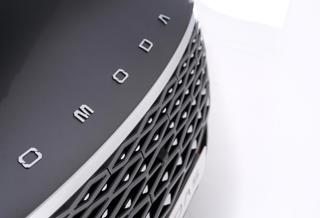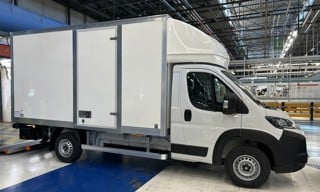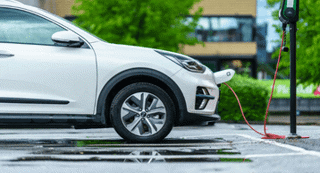Initial feedback from Zenith’s electric vehicle trial suggests drivers are generally satisfied but there are issues with cost, charging and range.
Zenith employees have been using two Zenith-branded Nissan Leaf models for the past three months, with the aim of assessing the real world viability of electric vehicles and, in particular, for fleets.
The vehicles are available for short, local trips. One vehicle can also be booked for longer journeys or to use for up to a week at a time.
Every single employee who has used the cars has rated the overall driving experience as ‘satisfactory’ or ‘extremely satisfactory’.
The car itself rated very highly, with 85% satisfied with its ease of use and 95% satisfied with the specification.
The interior design caught the imagination of three-quarters of the testers, the exterior less so. However, the design was rated above average by 50%.
Handling (95% satisfied or above) and performance (95%) both rated well, while 75% were impressed with the vehicles’ reliability.
The majority (95%) have been pleased with the vehicle’s environmental credentials, and two employees were even able to harness the use of renewable energy sources to charge the cars, in the form of solar panel generated electricity.
Every driver in the trial rated the cars’ noise levels as satisfactory or above, but 9% raised concerns that the extremely quiet motor could be a hazard for pedestrians.
Would they buy an electric car?
The trial is on-going and so far the cars have been driven over 3,000 miles by 45 different employees. Out of these 17% said they would definitely consider exchanging one car in their household for an electric car and 39% said they may consider it.
Several drivers stated that they would opt for an electric vehicle as a second car for local trips, while others would only consider it when concerns about range and charging are addressed.
While the vast majority of Zenith employees were more than satisfied with the cars themselves, it is clear that they have limitations and are only currently useful for certain types of travel.
The availability of charging points was a problem for 40%, 53% were dissatisfied with the range of the vehicles and 50% felt that the charging time was poor or very poor.
The range of the vehicles was of particular concern at night when the power is being reduced further by the additional use of lights or during warmer weather when the air conditioning is in use.
The cost of buying a vehicle was cited as a factor which would prevent 25% of employees from making the change to electric motoring.
In preparation for the trial, and for any other electric vehicles run by staff or visitors, Zenith installed a charging point at the company’s head office in Leeds.
Electric vehicles do have a use for businesses
Tim Buchan, chief executive officer of Zenith, commented: “This has been a very interesting exercise. Almost without exception, our employees love the Nissan Leaf to drive, but reservations remain around the range and charging the vehicles, particularly charging times and availability of charging points.
“Our employees really rated the cars for driving in the local area and they could save money on fuel by charging the cars at work.
“We believe electric vehicles do have a use for businesses, particularly as pool cars to be used for short journeys, for longer trips within the range or where there is an overnight stop when it can be charged. “Improving charging times and practicality of charging would assist their take-up, as would increases in range.
“We know that manufacturers are working hard to improve technology and expect that these limitations will be overcome with further investment.
“In the recent Autumn Statement the Government announced it was reviewing the Benefit in Kind tax position for electric cars. We do hope they reverse the decision to end the tax breaks for ultra-low emission vehicles from 2015.
“If technology is to improve and if users are going to be encouraged to embrace changes to alternative fuels, then incentivisation along with investment in development and infrastructure needs to continue.”
Driver comments
Drivers were asked to give their comments. Here is a selection:
“Performance was a lot better than what I had expected.”
“Very responsive to driver and has plenty of acceleration when required.”
“It does not feel reliable or practical in the sense the battery could deplete quickly and there are no wide spread public charge points, making long journeys almost impossible.”
“It puts me off that the maximum journey length you can do is approx 80 miles before it needs charging so you can't do long journeys in it.”
“Until charging times can come down to something more realistic like 15 minutes then this won't be a viable solution to have as your main or only car.”
“If affordable to buy, I would love one for local use or commuting.”
“I was initially sceptical but driving this nearly everyday grown to love it.”
“They are surprisingly powerful and smooth. It is a highly enjoyable drive.”
“Should the charge time/ease of charging improve to be as efficient/nearly as efficient as visiting a petrol station, then I would consider it strongly."
"Charging time was too long.”
“Range needs to be slightly more.”






















JP White - 24/12/2012 15:01
I found the comment regarding reliability to be illuminating. Drivers seem to confuse mechanical reliability with perceptions if they can rely on the cars range to get them to their destination. Capability and reliability are different. Electrics are typically more reliable mechanically speaking. Other than that confusion, the comments seem to be mostly valid. For those wanting 15 minute charge times, Level 3 charging comes close to that. Education is necessary as well as general driving experience. It is pleasing to see the drivers warming up to the vehicle the more they drove it.